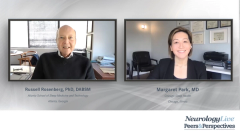
Challenges in the Diagnosis of Narcolepsy
Drs Margaret Park and Russell Rosenberg discuss challenges in the diagnosis of narcolepsy.
Episodes in this series

Russell Rosenberg, PhD, DABSM: There are some challenges within the diagnostic process certainly. And let me just run a couple things by you. I like what you said about repeating the test, but maybe we’ll talk more about that here in a second. And that is if the patient pretty clearly from a clinical perspective, you suspect cataplexy, you suspect narcolepsy, but they don’t demonstrate say the 2 sleep-onset REM [rapid eye movement] periods during the MSLT [multiple sleep latency test], or 1, during the nighttime that’s required. Now we’re getting sort of into the technical weeds here. But what do you do in that case?
Margaret Park, MD: That has been a very, very prevalent concern these days. I’m sure you’ve experienced this too. Or I am pretty sure if somebody is telling me they have cataplexy, I’m like, “Yes. I think you have narcolepsy,” but those 2 sleep-onset REM periods just are not showing up. And I think that that’s where we’ve dug ourselves into a hole a little bit because of a lot of the elucidation of the pathways that we did not know before the year 2000. With this, we were so excited. And we were like, “Wow, this is what happens with these REM periods, and this is what happens.” That now, it’s been pigeonholed into you have to have this in order to have the diagnosis. And, again, reiterating your point, we don’t treat a number, we don’t treat a test result. And thus, if you’re pretty sure that narcolepsy is occurring in this particular patient, then you need to be able to treat that. And saying that you have to have this test result in order to be diagnostic means that you don’t even have to see a sleep doctor, right? We just have to do the test but we know that that’s not the case. Hence, we need to come back to this idea that narcolepsy is a clinical diagnosis. We have to talk to the patient, see what symptoms they have. And whatever the test result comes out saying, you got to pick apart the pieces of the test that match what you think is going on. We don’t let that dictate what’s going on. Because a real-life situation is that a lot of these patients, just like a lot of other non-narcolepsy patients, they’re on things that affect sleep. And they do have blood pressure medicines, mood medications, including antidepressants, and these things do affect different sleep stages.
Now, diagnostically, I know that there is this big debate with amongst clinicians of do we take these people off these medicines to get a pure sleep study. I don’t think that’s practical. If someone’s telling me that they also have a history of depression, and it’s very well controlled on whatever they’re taking, I don’t think it’s a good idea to take them off of it just for the sake of getting the sleep-onset REM periods. Thus, I do caution a lot of diagnosticians, a lot of clinicians, that when you get these test results, try not to be too pigeonholed on the appearance of certain sleep stages. Now, on the other hand, I do think that the mean sleep latency, it does pack quite an impact. It’s not, “Is it normal to fall asleep during these naps if you’ve gotten a good night’s sleep?” No. But the cutoff of that is also controversial. There are published means across the population. And then, there are published means across patients who we think of as being classically afflicted with narcolepsy. But those studies do also center on these 2 sleep-onset REM periods. Hence, what do we do with a patient who we think is very, very sleepy, but they don’t meet these classic criteria? I do tell people when they’re interpreting these reports, please look back on the clinical history, look at the patient, listen to what they’re saying, and then take those test results and fit it into what they are presenting with. And then, that would be a better use of these tests than just looking at these numbers.
Transcript Edited for Clarity
Newsletter
Keep your finger on the pulse of neurology—subscribe to NeurologyLive for expert interviews, new data, and breakthrough treatment updates.









